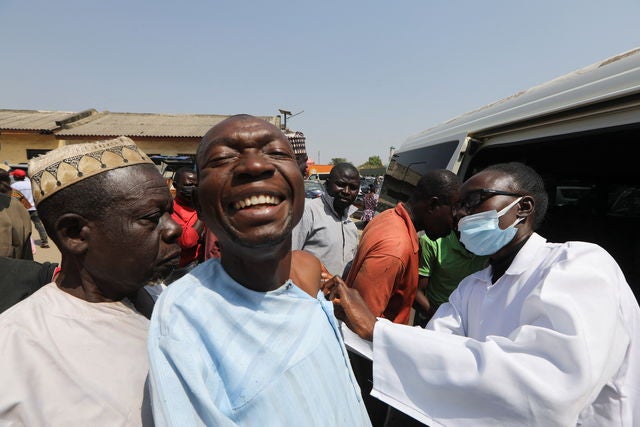Increasing COVID vaccination rates in Africa
On the sidelines of UNGA, experts shared best practices and key takeaways for turning vaccines into vaccinations across the continent

The uptake of COVID-19 vaccinations across Africa has been slowed by both supply and demand issues – including health systems’ limited reach and low trust. As a result, only about 21 percent of Africa’s population has been fully vaccinated against COVID-19.
Ministries of health leaders, experts, funders, and practitioners shared insights, promising strategies, and best practices to increase adult vaccination rates and sustain immunization systems moving forward at a panel discussion sponsored by The Rockefeller Foundation and Amref Health Africa, held on the sidelines of the United Nations General Assembly on September 21.
Dr. Ahmed Ogwell Ouma, acting director of the Africa CDC, explained that many African countries had no previous infrastructure for delivering vaccines to adults. To build an effective delivery system, Dr. Ouma said, understanding and adopting a local lens, language, and context are critical as is leveraging local institutions and expertise.
The African Union’s COVID-19 Bingwa Initiative as an example of such an approach, said Dr. Ouma. The initiative is a public- private year-long campaign that seeks to establish a network of youth champions for vaccination across the continent. It includes the use of music and art to drive behavior change and leverages local and national influencers.
Also on the panel was Rashid Mang’anda, a frontline health worker from Malawi, who highlighted Malawi’s Vaccinate My Village initiative, implemented in partnership with UNICEF. The initiative supported five week-long campaigns in May and June 2022 in all 29 districts of the country. The aim was to access hard to-reach areas. The strategy included going house to house among traditionally marginalized communities and campaigns at secondary schools, markets, and shops. The effort succeeded in vaccinating more than 742,162 people.
Immunization in rural Malawi is supported by the country’s Health Surveillance Assistants, which have helped connect health systems and rural communities since the 1960s. Recruited initially as temporary “smallpox vaccinators” and “cholera assistants,” today Malawi’s 11,000 HSAs play a key role in COVID immunization, disease surveillance, HIV and AIDS outreach, family planning, and malaria prevention.
Seth Berkley, CEO of GAVI, the Vaccine Alliance, said that vaccinations need to be solved as a systems program, and needs to start with strengthening access to primary health care. Dr. Rispah Walumbe, Health Policy Advisor for AMREF Health Africa, also shared that working with local implementing organizations and civil society organizations is critical for sustainability of COVID-19 vaccine roll out.
How can we help you?
believes that the quickest path to improving health outcomes to identify positive outliers in health and help leaders implement lessons in their own countries.
With our network of in-country and cross-country partners, we research countries that have made extraordinary progress in important health outcomes and share actionable lessons with public health decisionmakers.
Our research can support you to learn about a new issue, design a new policy, or implement a new program by providing context-specific recommendations rooted in Exemplar findings. Our decision-support offerings include courses, workshops, peer-to-peer collaboration support, tailored analyses, and sub-national research.
If you'd like to find out more about how we could help you, please click . Please consider so you never miss new insights from Exemplar countries. You can also follow us on Twitter and LinkedIn.
